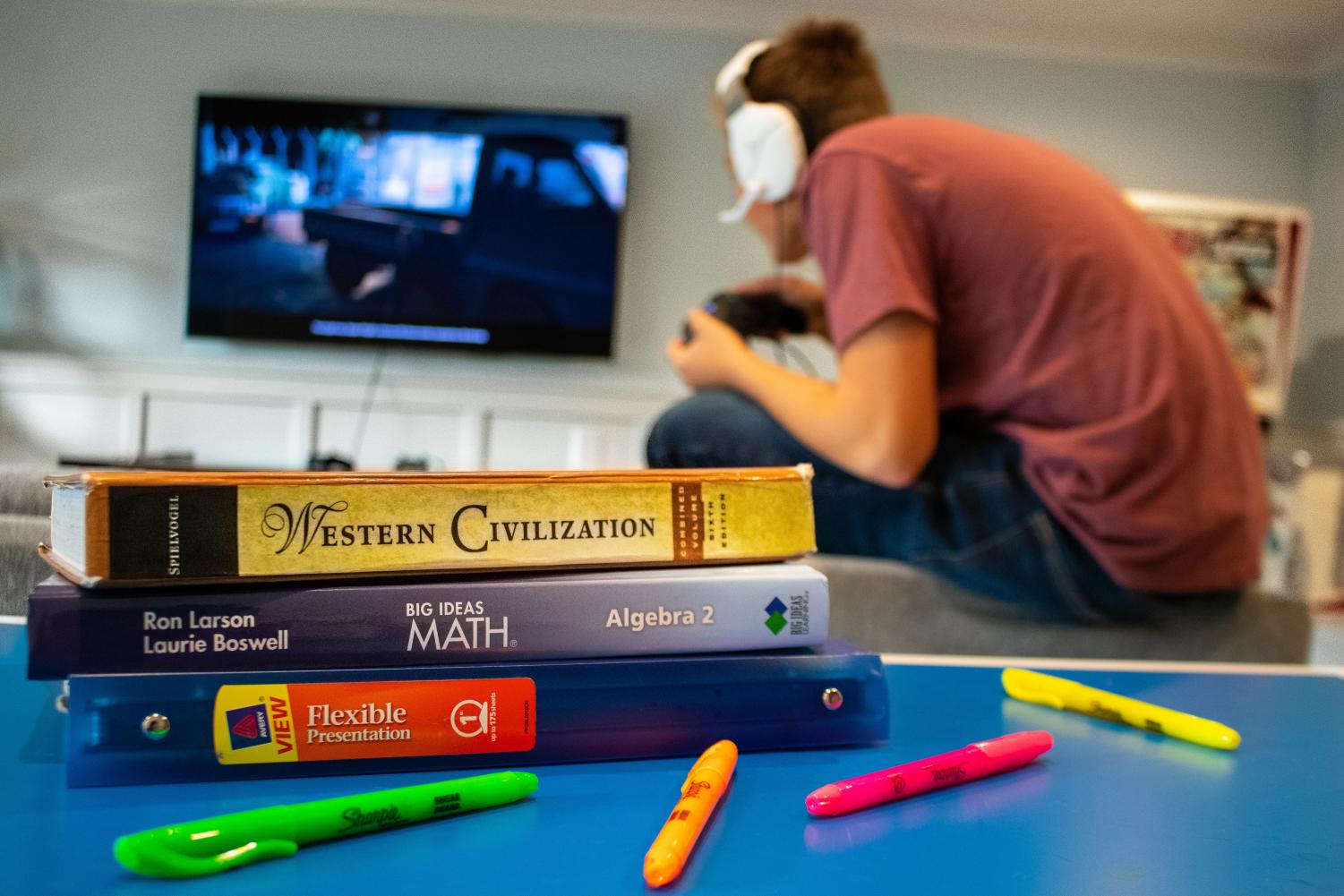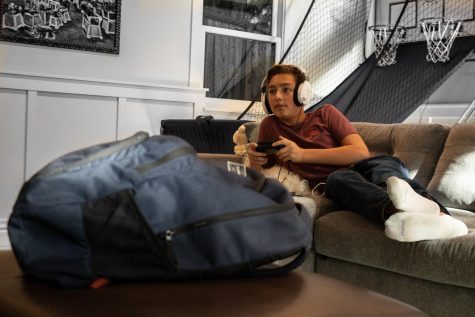
Twitter: @arghazouli

Twitter: @FiniganOwen


April 27, 2020
All you want to do is take a break, but a binder full of work demands attention.
With homework at the back of your mind, the temptation to scroll through Instagram and talk to friends overpowers the need to be productive. The subconscious neglect for work continues, waiting for the perfect moment to strike.
As midnight rolls around, panic overtakes your half-closed eyes, and your once static hands bolt through your school bag to recover your forgotten responsibilities. In a one-person-frenzy, you speed through some worksheets, skim through the day’s reading, and frantically write a paper.
Papers fly across the room as you shuffle through countless assignments in search of your math homework. By the time 2:00 a.m. arrives, the haywire nature of the once semi-organized room has yet to subside. Quality of work is not a priority.
After finally scaling the mountain of work, the overwhelming stress derived from the reluctance to start working leaves your body. However, the early morning ahead closes in. Tomorrow’s educational adventures may turn into nap time.
Maybe next time, you’ll take the constant warnings from teachers and parents against procrastinating more seriously. After all, nothing good comes out of procrastination.
At least, that’s what most people think.
Before delving into the advantages and limitations of this practice, it must first be addressed that there isn’t just a single type of procrastination. In reality, there are two types common among all people: passive procrastination and active procrastination.
The classic idea of procrastination is known as passive procrastination. Characterized by the inability to stop putting off tasks, it causes many to struggle to complete assignments within the desired time frame.
On the contrary, active procrastination is the more positive relative of stereotypical procrastination. Active procrastination is deliberately putting off tasks to create positive stress, which makes an environment with just enough pressure to enable quick and efficient work. Often, this also allows smaller assignments to be done in the meantime.
“I’ve seen positive stress, where students can manage it and use it to their advantage and perform at a high level. But I’ve also seen some very negative stress that habilitates to a point where anxiety takes over, and they can’t function,” Principal Ralph Crame said.
According to “The Journal of Social Psychology“ by Angela Hsin Chun Chu and Jin Nam Choi, active procrastination can allow those wielding its powers to “achieve as much as possible in the least possible time.” And, when compared to traditional procrastinators, active procrastinators “showed higher levels of purposive use of time and time control.”
Many students like Sam Jones, a Carlmont junior, were unaware of the different types of procrastination. However, Jones wonders how accurate these claims really are.
“I’m not sure how beneficial active procrastination would really be. I guess I’m just so used to trying to avoid it that I never really thought about how it could help me,” Jones said.

Currently, the stigma around procrastination causes many to wince at the thought of actively putting off work. While some quickly accept the idea that procrastination can be helpful, others are more reluctant to come around on the issue.
“I don’t really think procrastination would help overall. I think that mainly procrastination just adds to student stress,” said Kristin Vernon, a Carlmont counselor.
Some may even be a little skeptical right now, wondering about all the other studies showing how bad procrastination is. Addressing this is simple; procrastination is bad, but only when it is utilized incorrectly.
Studies like those by Aliza Rotenstein, Harry Z. David, and Lawrence Tatum show that procrastination leads to lower grades and overall performance. However, this study focuses on chronic procrastinators versus early birds, which is not active procrastination. This study, in particular, fails to even address other forms of procrastination.
“Depending on the reason for procrastination, mild or active procrastination can promote increased motivation, focus, attention, and creativity. This will contribute to the desired outcome and a better quality product,” said Elda Aghazarian, Carlmont’s psychologist.
Some have already inadvertently felt the benefits of active procrastination. Take one Carlmont sophomore as an example.
Maria Valle Remond gets home at about 4 p.m. every day. Like many other high school students, Valle Remond often has to stare down a daunting amount of homework while still feeling the exhaustion from a long day of lectures and assessments.
However, despite what many are conditioned to believe, Valle Remond recognizes that a late start to her school work may even be beneficial.
“Starting homework a bit later allows you to just destress from everything you went through at school for 7 hours and just relax and do whatever. This allows you to feel recharged and more motivated to do work later,” Valle Remond said.
Valle Remond also acknowledges how a little bit of pressure often helps her think in more abstract ways.
Recently, procrastination has been estimated to affect an astounding 80% to 95% of college students, according to a study by the American Psychological Association. However, their procrastination-free peers may have a habit just as detrimental as passive procrastination.
Precrastination is the opposite extreme of procrastination and affects a much smaller margin of the everyday population. At first glance, this concept seems ideal. After all, most people strive to get their work done early.
But upon closer examination, it is revealed that this habit causes the creative and efficient environment that procrastination is known for fostering to be lost, according to an article by Harvard Extension School. Precrastinators and chronic procrastinators even tend to have less original ideas than moderate, more active procrastinators, according to an experiment by Jihae Shin, who is now a professor at the University of Wisconsin.
“I don’t like starting work early because oftentimes, you’re more productive when you get to plan more, and it’s less stressful to do it all in one night. Even if you want to get ahead, it’s probably better to break it down into chunks,” Valle Remond said.

While there seem to be many appealing aspects to active procrastination, some teachers still oppose the idea of partaking in it.
“There are probably certain situations where it makes more sense to not do things right away. Maybe you’d want to take some time to stop and think about it and process it first. But generally speaking, and if it’s a regular and predictable thing, it might be better to do it sooner rather than later,” said Gregory Schoenstein, a Carlmont history teacher.
Schoenstein’s sentiment is reflected in many others as well, as active procrastination just isn’t built for everyone.
Between students like Valle Remond and those who can’t stand to have an incomplete assignment in their midst, there are different extents of procrastination and precrastination. Finding what works best as an individual is essential. But it is crucial to consider the benefits of controlled procrastination and what it can do to improve creative and academic output.
“I think we all need to learn about ourselves and how we work best. Sometimes, people work better with a time constraint, so that could be active procrastination,” said Andrew Ramroth, a Carlmont math teacher.
According to “Early Birds versus Just-in-Timers,” active procrastination is mainly useful for high scoring students, while it may negatively affect those who aren’t as comfortable with the material.
Still, the benefits derived from active procrastination remain for those who are up for the task. After all, actively procrastinating allows the mind to problem solve in new ways.
The brain continues to work on tasks even when the conscious mind has moved on. This is because complex problem-solving portions of the brain remain active despite the shift of attention, according to a study conducted by the University of British Columbia.
“Our brains are pretty cool because they can solve problems subconsciously while you’re not actively thinking about them. A common example is when you’re thinking about the name of a song, and then two hours later, it just pops in your head. Your brain was still thinking about it, and that can be really valuable for problem-solving,” Ramroth said.
Active procrastination is also useful, as short breaks while working lend themselves to long term goals, according to a study by the University of Illinois at Urbana-Champaign. The temporary unproductive break refocuses the mind, which improves motivation and helps prevent decision fatigue, the breaking down of motivation and reasoning ability after having to make frequent decisions.
Many people have employed this tactic, including Carlmont teachers and other accomplished individuals.
“I possibly do a version of active procrastination. If I have two hours of work to do, I know I’m not going to want to do it, and I’ll just end up sitting on the couch miserably looking at my phone,” Ramroth said. “So, what I try to do is do like 25 minutes of good work, and then 10 minutes of my hobby, 25 minutes of work, and then I get rewarded by 10 minutes of my hobby, and I go back and forth that way. So, I kind of procrastinate with the stuff I actually enjoy doing.”
Whether it’s procrastinating on a Spanish worksheet or a history outline, Ramroth emphasized how keeping organized will help prevent unnecessary stress.
In controlled amounts, procrastination allows students to reap the benefits of a little pressure, which maximizes the quantity and quality of work they get out of the allotted time. However, if kept unchecked, students will be left overwhelmed, having fallen victim to an overdose of omitted tasks.
It is important to understand that there is a sweet-spot in procrastination, and failing to cut breaks short leaves many in a less than ideal situation. A slip up will happen from time-to-time, but many let it get to the point of 2 a.m. cramming, disguising chronic procrastination under the mask of a helpful strategy.
That being said, it seems that all the lecturing and pestering by others about avoiding procrastination aren’t all that accurate; they fail to paint the whole picture and demonize a practice that could be used for student benefit.
“I think procrastination is a super normal human thing to do,” Ramroth said. “We’re just spending our time fighting it off and trying to learn how to be efficient throughout the entire day, but know that it’s a normal, natural thing.”

